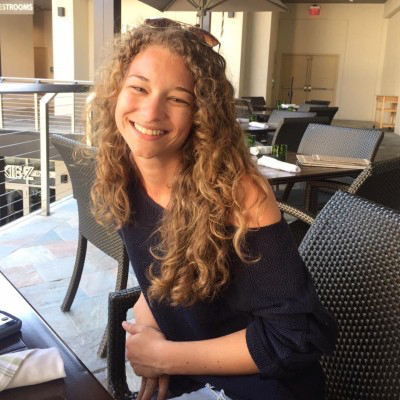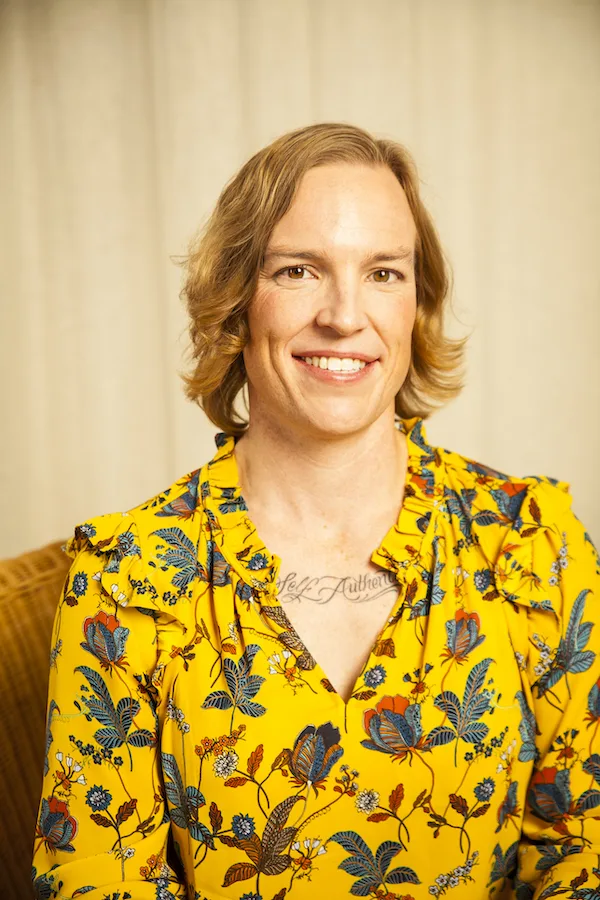Creativity is a versatile skill. Some use it to create sculptures, others to reach the remote without standing up. For Jerrica Kirkley, M.D., co-founder and chief medical officer of Plume, creativity has been key to her success.
“It’s just such a big part of every facet of my life,” she says. “We as physicians, as healers, have patients in front of us every day who have really challenging situations—some things don’t always play out as the textbook would tell you.”
After all her years as a doctor and founder, Jerrica understands that success requires adaptability. But for someone like her—a transgender woman—creativity is also survival: a way to navigate a world hostile to her dreams and very existence.
From Rural Conservatism to Progressive Freedom
Jerrica says entrepreneurship was never something she even considered—her first passion connected to her love of science and community.
Born and raised in North Carolina, Jerrica grew up in a very conservative environment: “Southern Baptist family—the whole nine yards.”
With this dominant culture, Jerrica says, came suppression of progressive causes like gender or racial justice. It wasn’t until she left for college that she shook off these toxic ideas and came to accept her identity as a woman.
Jerrica’s newfound liberation coincided with her desire to go into health care as a physician. She was hungry to reach the most underserved communities, viewing medicine as a vehicle for social justice. But even while pursuing her doctorate, Jerrica’s entrepreneurial spirit would shine through.
Enter Matthew Wetschler, M.D., Plume’s co-founder and CEO.
“We were best friends in medical school, attached at the hip,” she recalls fondly. “I think we both got through medical school because of each other exclusively.”
The students found ways to keep themselves busy between classes, which included taking up a sport for a good cause.
“One of the things we did in medical school was run a cycling team for an HIV/AIDS benefit ride,” she recounts, with the pair growing membership and even securing local sponsors. “I think that was always our mentality.”
Jerrica points to his “profound compassion and a depthless curiosity” to understand himself and the world around him as reasons why Matthew is such a great business partner and ally.
“When I came out to Matthew, he immediately hugged me and told me how happy he was for me,” she recalls. “He didn’t know another transgender person at that time, but he saw me for who I am, without hesitation.”
Plume Blooms
Jerrica says one reason for his boundless loyalty and empathy comes from his own horrible experiences. Prior to Plume, Matthew suffered a catastrophic spinal cord injury while surfing, leaving him wheelchair-bound for a year and in deep medical debt.
Living through the best and worst of the U.S. health care system leaves an impact. Matthew decided to devote the rest of his life to creating better health care for the most marginalized groups.
“Matthew has been an integral part of, not just Plume’s experience and lifespan, but my life,” she says. “I think we take the ethos of our story—of people who are passionate about improving other people’s lives—drawing from our own experiences and acknowledging that they’re different.”
Jerrica and Matthew’s shared passion and drive had a proven ability to deliver results and revenue, a lesson neither would forget, even as they went their separate ways after graduation.
The doctors stayed in touch and eventually began exploring launching a health tech startup. Through weekly phone calls, the two brainstormed, analyzed, and discarded over 50 ideas before they settled on gender-affirming care, something Jerrica had become familiar with on the job. Not only was it lifesaving, but also a highly neglected field.
“We both had this light bulb moment,” Jerrica says. “This is super important care. It’s hard to get. Digital health is starting to be a thing—pre-COVID, of course—so it’s not on people’s radar.”
And with a little magic, Plume Health, the virtual gender-affirming care clinic for transgender and gender-nonconforming patients, was born. With everything coming into place, they were ready to start fundraising.
Little did they know, the world was about to be brought to its knees—and laid out at their feet.
Timing, Timing, Timing
One lesson that Jerrica has learned: Almost nothing beats good timing. Their initial fundraising round for the telehealth app came around the rise of COVID-19, while the second was announced during the pandemic telehealth boom.
This global crisis created an impromptu market and demonstrated the value of telehealth, making it easier to pitch a solution for the ever-present disparities in transgender health care.
Jerrica says her life experiences go hand in hand with seeking investment. Early in her career, she was assigned to assist patients living in relatively blue-collar areas, often the first transgender person locals had ever met. This required a massive amount of patience and delicate engagement, which unknowingly became her training course for pitching a deck while trans.
“Like, over and over, what [being transgender] means, and why I am no different than anybody else,” she says. “There’s always a mixed bag of experiences, but I will say the folks we have around the table have been incredibly supportive.”
Through her steadfast approach, investors stopped probing about personal details and began asking questions about Plume.
“I think one of the most important pieces was believing with all our hearts that this needed to exist in the world,” she says. “The authenticity resonates with others and builds trust.”
To date, they have raised $38 million for transgender health care, providing care to over 40,000 transgender and gender-nonconforming patients across 48 states—no small feat in unprecedented times.
Stabilizing in Chaos
Chaos currently reigns in America, providing founders and investors with perpetual whiplash.
“Stability is relative these days, but we try to lead with honesty, vulnerability, and transparency,” she explains. “We encourage people to ask the hard questions, and we are realistic in what we can and can’t do in the moment.”
But, under the current administration, she is under no illusion about the state of her country.
“The reality is I’m a transgender person—I dedicated my career to supporting transgender people in health care,” she says. “So that is a position that is going to put us in situations where people don’t agree with that all the time.”
Staying positive is admittedly hard, Jerrica says, but she always works to bring her focus back to gratitude for all the beautiful things in her life, “of which there are many.”
“Knowing that, despite the headlines and political attacks, there are a lot of people who care deeply and are doing incredible work,” she says.
She hopes for a future where any transgender person can get medical care that applies the basic principles of kindness, respect, and informed consent. “There is no one way to do health care for the transgender community,” she says.
When it comes to her legacy, Jerrica hopes she embodies the message that “we are stronger together.” But for those who question the legitimacy or existence of the transgender community, it shows they are blind to the history of human civilization.
“If there are people, there are transgender people,” Jerrica says. “We are here, we will always be here. And no bill, law, politician, news article, or social media post can change that.”

About the Author: Tess Danielson is a journalist and writer focusing on the intersection of technology and society.
Get on our radar for an investment.
Beta Boom invests in founders who don’t fit the traditional Silicon Valley mold.

